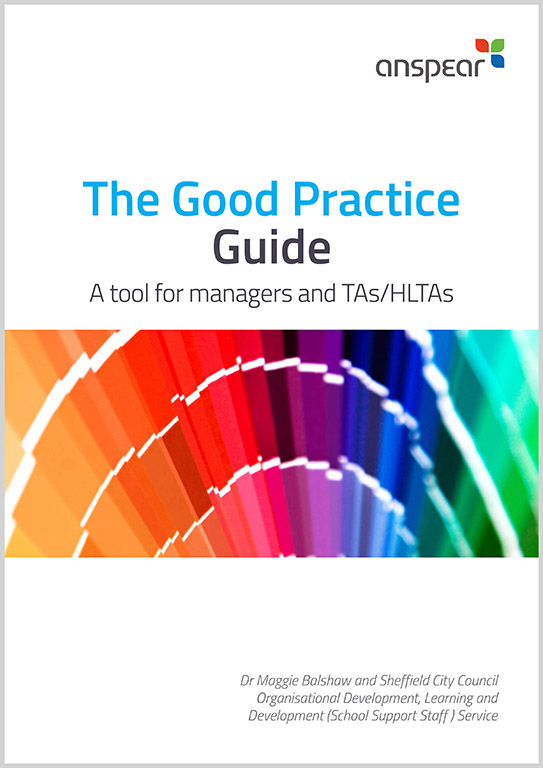The Good Practice Guide
Dr Maggie Balshaw and Sheffield City Council Organisational Development, Learning and Development (School Support Staff) Service
A tool for managers and TAs/HLTAs
- Enable effective staff management/deployment
- Improve the way that staff work with TAs/HLTAs
- Review and improve practice
- Provide a better experience for pupils
- Maximise staff talents and skills
Make a difference
“I’m only a TA…” is a familiar cry, yet teaching assistants (TAs) and higher level teaching assistants (HLTAs) are crucial to the smooth workings of a school. Their role is wide and varied and it contributes significantly to schools’ success. However, practical support for the whole school – from headteachers to TAs/HLTAs themselves – is hard to find. Every school’s circumstances are different, and the management of staff can vary widely.
An informed approach
The Good Practice Guide aims to address the key issues that schools face. Developed from the government Good Practice Guide (2000), through research by the University of Manchester and action research led by Sheffield City Council Organisational Development, Learning and Development (School Support Staff) Service, it focuses on the ‘building blocks’ of effective practice.
The resource helps you to focus on your school’s particular needs and find an appropriate and practicable development strategy.
Meet your school’s needs
The Good Practice Guide enables your staff to discover best practice in the context of their own school. At the core of The Good Practice Guide are ten indicators of effective practice. For each indicator, there are specific questions for:
- headteachers and governors
- line managers
- leaders of learning
- teams of TAs/HLTAs and teachers
- TAs/HLTAs
- teachers seeking guidance on working more effectively with TAs/HLTAs.
For each indicator, there are also questions that invite exploration of current practice and suggest pointers for development.
Meet TA/HLTA needs
The Good Practice Guide enables TAs/HLTAs to explore their professional role through self-discovery. The aim is to help them to improve practice, understand their school context and identify pathways to further professional development.
Covers key topics
The Good Practice Guide enables your school to consider how best to:
- improve professional development
- access appropriate training initiatives/frameworks
- use feedback and appraisal
- offer guidance, clarity and consistency
- maintain continuity of experiences for pupils
- enhance the curriculum
- organise staff mentoring
- help teachers work more effectively with TAs/HLTAs
- provide an ethos for effective working conditions.
Help prepare for Ofsted
The Good Practice Guide provides supportive strategies for whole school self-evaluation. It is ideal for helping your school to get good evidence in place in preparation for Ofsted inspections.
Supportive and easy to use
The Good Practice Guide also includes a wealth of supplementary information, including:
- stimulus material drawn from research data
- research strategies
- examples of school-based staff development activities
- outline action plans and reviews
- Web sites and further reading.
Convenient digital format
The Good Practice Guide comes with a full site licence. This means that all the material can be shared throughout your school and can be viewed onscreen or printed out on demand.
Contents
Introduction
- Context
- Using
- Areas
- Tools
Resources
About the authors
Maggie Balshaw is an independent consultant/researcher with over 20 years’ experience in carrying out action research and inquiry-based development in collaboration with schools and local authorities. It is due to the vision and leadership of the Sheffield City Council Organisational Development, Learning and Development (School Support Staff) Service team that the practice developed for support staff in Sheffield’s schools has been so effective, particularly for the professional development of TAs/HLTAs.



